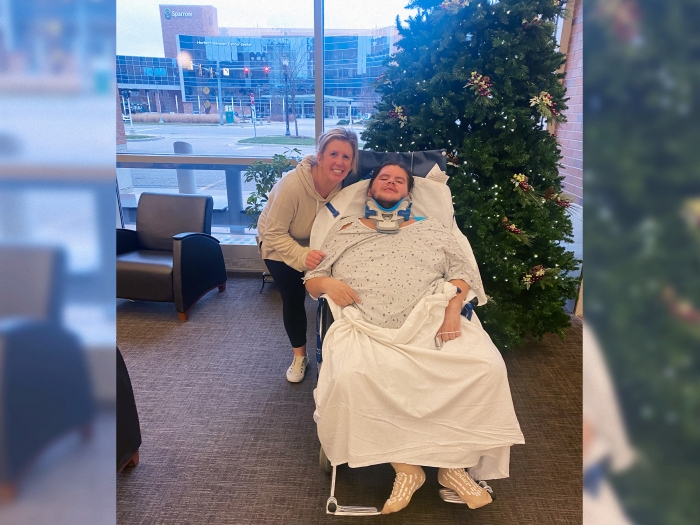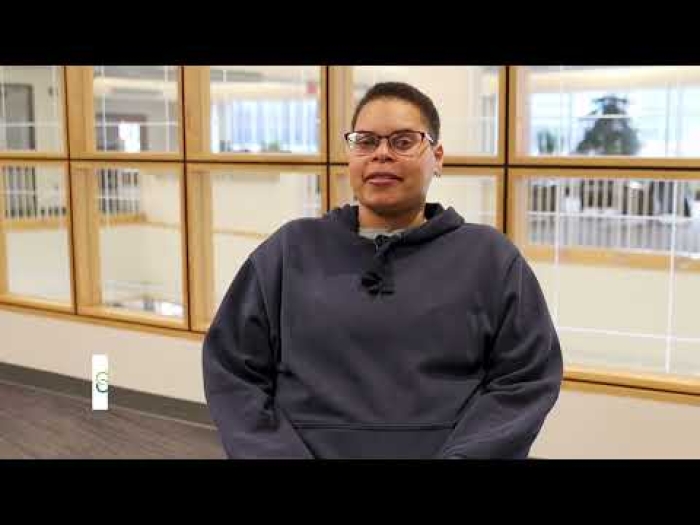Since Amy Bacon’s heart transplant, she’s received three academic degrees and is working on a fourth while also educating high schoolers about the importance of organ transplants
9:00 AM
Author |

Amy Bacon remembers the exact time when the call came that a new heart was waiting for her.
It was 8:07 p.m. on June 26, 2012. Bacon was sitting on the couch in her mother’s home in Jackson, Mich., where she’d been staying since being diagnosed with congestive heart failure a year earlier.
Bacon’s mother answered the phone, but Bacon could hear what was being said. She shouted, “I’ll take the heart for $200, Alex!”
“I can’t even put into words what that feeling was like,” Bacon says of getting the call from the University of Michigan Health Transplant Center. “I do know that I immediately got the bubble guts.”
The past three years had been traumatic for Bacon — full of health concerns that left her wondering whether her life might be coming to a close.
Yet the heart that Bacon heard about that night in 2012 is still pumping inside her chest in 2023. It’s powered her to three academic degrees and kickstarted her doctorate in public health, which she’s pursuing at U-M. It’s even helped her get a job educating teenagers about the importance of organ transplants.
“I think that God sometimes makes you go through something so you can be where you’re destined to be,” Bacon said. “I’m 100% positive that I had to go through those trials and tribulations to be the Amy Bacon that I am today.”
“If I send you home, you will not make it back”
There were some early signs that all was not right with Bacon’s heart.
The chest pain started back when Bacon was in high school. But it was sporadic, and her family thought it came from pulled muscles, strained when she was scooping ice cream at her first job.
Or there was that time when she woke up in the middle of the night, heart pounding. Her mom waved her off, assuming she’d probably taken too many aspirin.
“That was back in 1985, ‘86,” Bacon says, “when young people having heart issues wasn’t a thing we recognized could happen.”
As an adult, Amy didn’t experience palpitations or shortness of breath. She did have anxiety and digestive problems, which can be lesser-recognized symptoms of cardiac issues.
I feel like I’m walking in my due season. I’m so glad that everything happened to me because I truly believe if I wouldn’t have had a cardiac arrest, then I would not be working on my doctorate today.”
- Amy Bacon
Her providers initially thought a virus had attacked her enlarged heart. She wasn’t diagnosed with heart failure until almost two years later when she’d developed a cough and gained weight from all the fluid that her body wasn’t able to clear out.
Bacon’s symptoms were concerning enough that the cardiologist immediately said, “We’re admitting you.”
Bacon protested, saying that she just needed some cough medicine.
“No, Amy,” Bacon remembers the cardiologist saying. “If I send you home, you will not make it back.”
Within the next day, Bacon was in U-M’s intensive care unit. Every two hours, providers came in to conduct what seemed to Bacon like more and more tests. Eventually, Keith Aaronson, M.D., the co-director of the Heart Failure and Transplant Management Program at U-M Health, came into the room and sat on Bacon’s hospital bed.
“You need a new heart, Amy,” he said.
Bacon was inconsolable; she hadn’t considered the possibility of a heart transplant. Aaronson held her hand until her mother arrived from Jackson.
“I cannot speak highly enough of that man,” Bacon said of Aaronson.
New challenges
Bacon was in and out of the hospital for the next several months. Every time her defibrillator, a device that uses electric currents to stabilize irregular heartbeats, shocked her heart, she had to go into the hospital to make sure it was working correctly and hadn’t gone off by accident. She was also taking the medication milrinone, which strengthens the heart but can be caustic for the body.
By February, she needed to be admitted to the hospital again. The only other option was a left ventricular assist device (LVAD), which is a mechanical pump that can support or replace the heart.
“The LVAD is a really challenging intervention to manage,” said Erin Ellman, L.M.S.W., who was Bacon’s pre-transplant social worker at U-M Health and now works as the fertility preservation program manager at U-M Health. “Having to deal emotionally with the fact that there’s a machine pumping your heart and if you don’t charge your battery, it’s not going to work anymore – that’s a big mental thing to get over.
“But if someone can get through that and do that, it’s a good sign that they’re going to be able to handle the stressors associated with a transplant.”
The recovery from the LVAD surgery was indeed tough. Bacon was in a lot of pain, and it was difficult to regain her mobility or go to the bathroom. She needed someone with her at all times. But ultimately, the device took the pressure off her lungs and heart in three months’ time, and Bacon was able to cope with the challenges – worth enduring when she found out she was getting a new heart.
“I felt like new money”
As Bacon was wheeled into the operating room for her transplant, she asked everyone to stop. Per her request, the team held hands and prayed with her.
When she woke up, she’d been expecting to feel as bad as she had after her LVAD surgery — “sicker than a dog.”
Instead: “I felt like new money,” Bacon said. “I didn’t have any pain.”
In fact, she felt so good she tried to book a trip from Aruba right from her hospital bed. The care team encouraged her to slow down, letting her know that her high dose of steroids might be giving her an inaccurate impression of the state of her body after major surgery.
But she knew, fundamentally, that she wanted to make the most of the new heart she’d been given.
“I remember my mom telling me, ‘Amy, God saved you for a reason,’” Bacon said. “‘No one can tell you what that reason is.’”
At that point, Bacon didn’t have any college degrees. She decided to get an associate degree in health information technology with plans to become a medical insurance specialist because she knew what it was like to navigate the medical billing process amid the stresses of a significant health condition.
But when she became the first Black keynote speaker at Baker College of Jackson, she realized she didn’t want to stop there. She received her bachelor’s degree in health services administration, also at Baker, and her masters in public health from U-M Flint, where she became involved in research and even traveled to Tanzania as part of her work on the connection between stress, anxiety and low birth rate.
SEE ALSO: A new heart brings new hope
Bacon now works at Gift of Life Michigan, the nonprofit that facilitates organ and tissue donation in the state. She travels to high schools to share with teenagers the details of organ donation: how one person’s organs can save up to eight lives, that all major religions support organ donation, that it doesn’t cost money to donate an organ.
“This is my dream job,” Bacon said. “I absolutely love what I do.”
She also teaches at Capella University, an online university, in the masters of health administration program.
“What I really love is that the students are from all over the United States, and they have so many interesting backgrounds,” Bacon said. “I’m learning from them as I’m teaching them.”
Bacon’s not done with her own formal education either. She’s pursuing a doctorate in public health at Capella under the mentorship of Silas Norman, M.D., a U-M Health nephrologist who works to improve access to organ transplantation in under-resourced communities.
“One thing that’s critically important as we think about educating the community is helping people better advocate for themselves,” Norman said. “No one’s more effective at that than our patients who have been through it, who can really speak to the patient experience – what the barriers are like, how to navigate them.
“So someone like Ms. Bacon has the potential to be, in many ways, more effective than the physicians in terms of helping people move forward with transplantation or, really, with taking charge of their health in the first place. It’s an easy decision to try to help support people who are trying to be impactful in that space.”
“I feel like I’m walking in my due season,” Bacon said. “I’m so glad that everything happened to me because I truly believe if I wouldn’t have had a cardiac arrest, then I would not be working on my doctorate today. Not only did U-M save my life, they’ve educated me,” she added. “So I definitely bleed blue.”

Explore a variety of healthcare news & stories by visiting the Health Lab home page for more articles.

Department of Communication at Michigan Medicine





